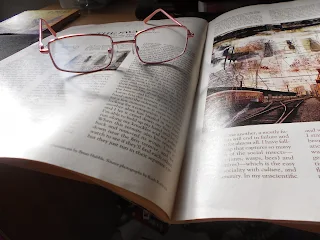Friday, February 07, 2014
Beloved Characters: Real or Imagined
Let me tell you some of the characters I can't resist; beginning with the Master in Chimamanda Ngozi Adiche's "Half a Yellow Sun," described in the opening lines this way: "Master was a little crazy; he had spent too many years reading books overseas, talked to himself in his office, did not always return greetings and had too much hair." You need to continue reading to find out more about the Master, but in this opening paragraph, the Master already intrigued me. When I read further, he had so many books on the floor, on the shelves, on the table, in the bathroom, even near his toilet bowl, and so, that even pushed me further to read because--it almost felt like home!
Another character: the academic who grew up in the city all her life but who suddenly drops and leaves everything behind to live and work as a shepherdess, as Gretel Ehrlich described herself, in “The Solace of Open Spaces,” “curled in a sagebrush, the way my dog taught me to sleep,” while “trailing a band of two thousand sheep across the stretch of Wyoming badlands.”
Mercalia, in Annie Proulx’s “The Shipping News,” after she “had thrown down her thesis,” and “had gone blue collar, enrolled in long-distance truck driving school, graduated summa cum laude, hired by the Overland Express in Sausalito.”
Thomas Hardy’s Jude the Obscure, particularly the part where Jude taught himself to read Latin, on top of a horse, while peddling the cakes from his Aunt’s bakehouse: “As soon as the horse had learnt the road, and the houses at which he was to pause awhile, the boy, seated in front, would slip the reins over his arm, ingeniously fix open, by means of a strap attached to the tilt, the volume he was reading, spread the dictionary on his knees, and plunge into the simpler passages from Caesar, Virgil or Horace, as the case might be, in his purblind stumbling way, and with an expenditure of labour that would have made a tender-hearted pedagogue shed tears...”
Amarzan, in Janet Steele’s “Wars Within,” who spent years as political prisoner in a penal colony of Buru Island in Soeharto’s Indonesia and taught himself how to write as a journalist of Tempo. “Where did you learn to write like this?” asked the Tempo editor and poet, as soon as he read what Amarzan had written after he was freed. “In Buru.”
Very soon, my friend Wahyu just told me, I'll get the chance to talk to the Amarzan.
There are other beloved characters I haven’t written, yet; and still others I can’t write about. I’m living with very interesting characters around me every day.
Subscribe to:
Comments (Atom)
